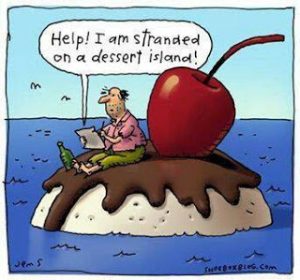
(“Man got stuck on an Island” n.d.)
As promised, we have returned from our wonderful trip to Galiano with meaningful memories and stories we would like to share with you. These have formed through our conversations, experiences, and connections formed with the island community and within our group. We have come up with some reflections on what we have learned and ideas we hope to manifest in our project moving forward. In this blog we hope to convey:
- How the reality of the past few weeks compares to our anticipated objectives (refer to blog 2) and what we still hope to achieve in the upcoming weeks
- Describe and reflect on our group’s Moments of Significant Change
- Outline our strategy for a successful project completion
Exciting, hey? Things are wrapping up fast, and we still have a lot to cover! Let us first rewind and bring you up to speed with our beautiful journey to the island and the many experiences we were fortunate to share as a group.
We began our trip bright and early with positive and excited energy in the car, making it on time to the Tsawwassen terminal in order to catch the morning ferry. The trip was short and sweet (just over one hour) giving us enough time to brainstorm questions we wanted answered and overall goals for the trip.
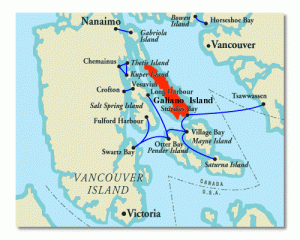
(“Vancouver to Galiano route” n.d.)
We were immediately greeted by Jane, our incredible community partner, and were taken to view our cabins at Driftwood Village, followed by a short hike in the Galiano Conservancy Area.
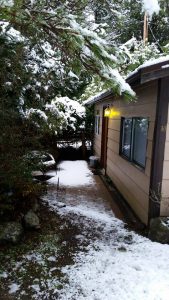
Our cabin – thanks again Jane for making accommodations and showing us around your community! (R. Spruston, 2017)
Next we met with Dave and Sharon Koster on their farm, where they were able to answer a few of our questions based on their experiences farming on Galiano Island. Here, we discovered their family’s farm-to-table values, which means knowing and appreciating where their food comes from. Dave and Sharon moved from Alberta to Galiano Island in search of a more hospitable climate and better ability to farm in closer alignment with their values. They initially explored the idea of having a small dairy, however cows are not practical for Galiano Island because they are too heavy for the thin topsoil, and dairy farming requires too much water, a limited resource on Galiano. Eventually they settled on sheep and chickens, which are best-suited to the island environment and their farming goals. We talked about some of the challenges and rewards of island farming, which we will save for our final report, so stay tuned! Dave and Sharon have created a beautiful farm, and we really enjoyed seeing their new lambs – (they were so cute)! The Kosters were very generous in allowing us to see their farm and overall we loved our visit.
As you may remember from our last blog, we had lunch at the Flying Black Dog – a small food vendor with exceptional meals, including many unique vegetarian options. The place actually had to close early due to their high popularity among locals and tourists – fortunately we arrived just in time!
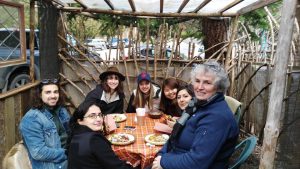
Our group and Jane enjoying fantastic food at the Flying Black Dog (R. Spruston, 2017).
After lunch we spent a few hours working with two lovely women, Allison and Nancy, in the kitchen of the Galiano Food Club Community Center, helping cook some delicious meals for members of their community who have physical or financial limitations that make cooking for themselves difficult. The meals included: turkey chili, tomato and pesto chicken with basmati rice, and coconut lemon chicken with spiced lentil rice, all of which were “tester meals” having not been made before and therefore involving some adjustments and fine-tuning but overall they looked (and tasted) great! Tester meals are prepped in advance and often adjusted throughout the cooking process. They are not usually made on days where clients are served (hence, they are packaged and put in the freezer) and are typically made on days where there are enough volunteers to help out, working out perfectly for our visit! It was also interesting to learn from these community members about their experiences cooking healthy, nutritious, and delicious food for locals that may need it.
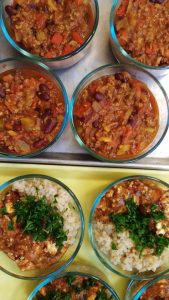
The meals finished and ready to be frozen (R. Spruston, 2017).
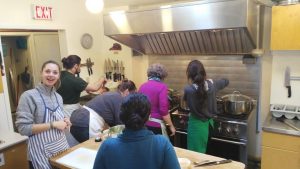
Working hard and and having fun in the community kitchen! (R. Spruston, 2017).
Next, Jane took us to the Galiano Bluffs where we had incredible ocean views and could see lots of surrounding islands!
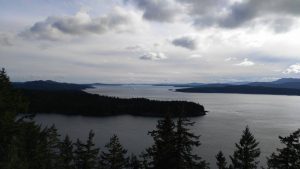
View from the Bluffs (R. Spruston, 2017).
After a market trip to pick out some snacks for the night, including bee pollen (interesting stuff!), we had dinner with Jane at Babes in the Woods, a popular local joint where we were able to share engaging and insightful conversations about our day, what life is like on the island, and how we all felt such strong feelings of inclusiveness and community. We talked a lot about how significant food is to the Galiano community; this was especially evident by speaking to various locals about their home gardens and desires to grow their own food, and the incredible ability it has to bring communities together around a shared vision. These values are shared by Valerie Segrest, who during a TED talk, talked about food sovereignty, that is, honoring the culture and practices surrounding food production, harvesting, and consumption, such as knowing where our food is from and how it was grown and harvested (Segrest, 2014). This idea of food culture on the Galiano island was very apparent to our group, and something that not all of us experience-or even notice-in our daily lives. Galiano island residents are respectful to their land and it is highly evident many of them try their best to maintain a strong and positive connection to their food. This could be by growing fruits and vegetables in a home garden, sharing their home grown foods with friends and neighbors, having chickens in the backyard for fresh eggs, or using food to connect to people. The latter is what we felt we were able to share an experience with on our trip. By participating in an afternoon of cooking, we were able to learn about Galiano life and how the Galiano food club plays a significant role in helping members of the community through direct conversation and the shared local knowledge from two wonderful community members. Moreover, we were invited over for breakfast at Alison’s house where it was a chance for us all to come together and reflect on our trip, and it was from her gracious hospitality and delicious food we were given the space to do so. We lose a lot when we lose our food culture-not simply losing flavors or nutrition-but the stories and culture get lost as well (Segrest, 2014).
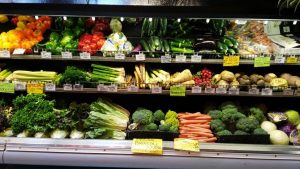
Vegetables at a local grocery store we visited (R. Spruston, 2017).
The night ended on a very sweet note at a local bar where we enjoyed a moving performance by Luke Wallace, a “folktivist” from Vancouver.
Unfortunately due to an unexpected ferry problem, we had to return back to Vancouver in the morning instead of the evening – involving a long detour to Victoria! But we enjoyed each other’s company and had lots of time to reflect on our weekend.
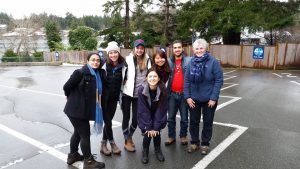
Final group shot before our morning ferry ride back to the city! (“Group Picture” n.d.)
Let’s recap what we were able to achieve from our weekly objectives and achievements.
| Objectives | Achievements | |
| Week 8 | -recognize the scope of change in our project
-manage the scope of change in our project -control the scope of change in our project |
-successfully prepared for our Galiano trip including synthesis of interview questions
-had an incredible experience with our community partner on the island! -completed thesis statements -reflected on our Moments of Significance as a group (see below)! |
| Week 9 | -access web-based infographic software to start our infographic
-articulate the need for communicating complex food system knowledge in a clear, accessible and meaningful medium -develop our first draft of our infographic for Galiano and BC Ferries -determine how our project can be completed by taking into account our Moments of Significance |
-stay tuned! |
| Week 10 | -reflect on our past achievements
-continue working on infographic -continue gathering information on Galiano and the chance of helping farmers on Galiano -gather current information and determine what information we are missing |
-stay tuned! |
| Week 11 | -reflect on our group work thus far
-compare experiences of our project with other groups -determine strategies and characteristics to effectively build our report -plan and implement strategies of how to successfully complete our Galiano, community based project -consider what other resources we may need to build capacity in our project work -understand the challenges we have reached thus far |
-stay tuned! |
Two weeks ago, we identified and discussed significant moments that have occurred in our project so far. This started off as an individual reflection, followed by a collaboration as a group, finishing off with a tour around the classroom to check other group’s significant moments! It was a fun and interactive activity because it allowed each of us to be involved with what we identified as significant in our project, which was often similar but sometimes very different! This allowed us to reflect on our original expectations of our project, what has happened so far and how we have managed any challenges, and what we anticipate (and hope) for the rest of our project. It allowed us to collectively assess our project progression in a way that incorporated everyone’s feelings and opinions. As you can see in the images, we were able to agree on some key events (what many significant moments were), but notice each individual’s line on the graph is slightly different, highlighting the importance that not everyone interprets and manages a situation or event the same. In the images you can see that significant changes have occurred throughout our project process-lots of ups and downs and some stability-for each of us. These maps represent a collective story of our individual journeys working on this process, and it also gave us a perfect space to check in with each other.
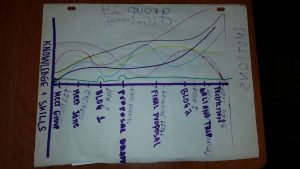
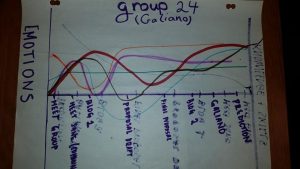 Top: knowledge and skills; Bottom: emotions that have changed through our major project events, highlighting our group’s moments of significant change
Top: knowledge and skills; Bottom: emotions that have changed through our major project events, highlighting our group’s moments of significant change
Now, looking forward, we have a few things to figure out. First of all, as you can interpret from above, our conversation with Dave definitely brought some uncertainty about our project goal. However, we realize that some degree of uncertainty is essential (and actually motivating) in a group project setting. As Shulman (2005) stated, “without a certain amount of anxiety and risk, there’s a limit to how much learning occurs” (p. 18). This experience allowed us to truly appreciate what we learned in class: that elements of our proposal do not necessarily coincide with the aspects of reality. By anticipating negative experiences of farmers with BC Ferries and realizing this is not necessarily true has forced us to have more conversations about our next steps and how to face and resolve this challenge. Moreover, our class readings and lecture helped up to recognize uncertainty is both natural and expected, such that it is a part of the journey and with hard work, good communication, and ideas within our group, we should be able to move forward in the following weeks.
To expand on this, we discovered Dave’s experiences with regards to livestock transportation using BC Ferries are not as negative as we had anticipated. Because there is no abattoir on Galiano and all meat that is to be sold must be slaughtered in a certified slaughterhouse, they have to take their livestock off-island for slaughter, to either neighbouring Saturna Island or Vancouver Island. This means each animal is typically transported only once in their lifetime. Dave transports his livestock in the evenings when temperatures are cooler and the ferries are less busy to minimize stress on the animals. He spends the night off-island waiting for his livestock to be slaughtered early next morning followed by his return to Galiano. This is a creative solution Dave has developed to the challenge of island livestock production. For Dave and Sharon, it was not so much BC Ferries policies that were the biggest challenge, but federal regulations surrounding livestock slaughtering. Based on their experiences, these are very stringent regulations and are often impractical against small-scale producers and their communities. This becomes particularly challenging with an island like Galiano that does not have its own abattoir to properly slaughter any of the island’s livestock. It was interesting to see what we anticipated as outside observers to be very different from the hardships and challenges the island community actually faces.
Our Galiano trip allowed us to assess our project proposal and original goals. We realized that our previously designed outline lacked in certain ways while it also has the ability to incorporate new ideas and opportunities. This means we have been experiencing some project scope change. After our trip, we reflected on and are currently developing strategies to address this scope change to successfully complete our project by next month. Moving forwards, we will incorporate the significance of Dave’s experiences and opinions about BC Ferries and federal livestock regulations regarding slaughter. However, we do realize this is only one farmer and therefore we intend to reach out to one more Galiano farmer via phone (whom we did not have a chance to meet in person). We will also address the island’s initiatives to eating sustainably and locally by growing a lot of their own food.

(“Goal” n.d.)
All in all, we learned a lot by experience this past week which will be valuable to our final project. Stay tuned for blog 4, you won’t want to miss it!
References:
Food Secure Canada. (2007). What is food sovereignty.
Mathie, A., & Cunningham, G. (2003). From clients to citizens: Asset-based Community Development as a strategy for community-driven development. Development in Practice , 474-486.
Segrest, V. (Director). (2014). TED talks; food sovereignty [Motion Picture].
Shulman, L. S. (2005). Pedagogies of uncertainty. Liberal Education, 91(2), 18–25. Retrieved from http://files.eric.ed.gov/fulltext/EJ697350.pdf
[Untitled illustration of ‘’Goal’’ conception ]. Retrieved March 10, 2017 https://www.linkedin.com/pulse/do-you-know-your-goals-heres-when-take-step-back-reevaluate-lozar
[Untitled illustration of a man got stucked on an Island ].Retrieved March 10, 2017 https://www.pinterest.com/pin/395753885980524853/
[ Untitled illustration of map route from Vancouver to Galiano]. Retrieved March 10, 2017 https://www.google.ca/maps/dir/Vancouver,+British+Columbia/Galiano+Island